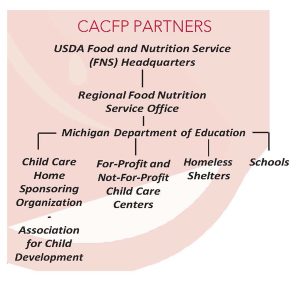
Building For The Future – Michigan
Dear Parent/Guardian,
Your child care home provider participates with the Child and Adult Care Food Program (CACFP), a United States Department of Agriculture (USDA) program. The CACFP provides cash reimbursement to child care home providers for nutritious meals served and helps children develop healthy eating habits. Child care homes participate in the CACFP through a Family Day Care Home Sponsor. The program is administered by the Michigan Department of Education.
Through the CACFP you can be assured that your child is getting balanced, nutritious meals and developing healthy, lifelong eating habits. Optimal nutrition is critical during children’s early years and promotes healthy growth and development.
As a participant in the CACFP, your child care home provider receives reimbursement for serving nutritious meals and snacks. Meals and snacks must meet the USDA meal pattern requirements listed below.
MEAL REQUIREMENTS
Breakfast
1. Fruits or vegetables
2. Whole grain or enriched grains or breads (such as toast, muffins,
pancakes, etc.) or a meat or meat alternate (such as eggs or yogurt)
3. Fluid, pasteurized milk
Lunch/Dinner
1. Meat or meat alternate (such as poultry, fish, cheese, dry beans, etc.)
2. Whole grain or enriched grains or breads (such as bread, pasta, rice,
tortillas, etc.)
3. One vegetable and one fruit or two vegetables
4. Fluid, pasteurized milk
Snack
Choose any two of the following:
1. Fluid, pasteurized milk
2. Vegetables
3. Fruits
4. Whole grain or enriched grains or breads
5. Meat or meat alternate
Children less than one year old: Foods in the infant meal pattern vary according to the infant’s age. If your child is less than one year old, please ask your provider for a printed copy of the infant meal pattern requirements.
What is the CACFP?
The CACFP is the Child and Adult Care Food Program, a federal program that provides monetary reimbursement to facilities offering healthier meals and snacks to children. Each day, more than 4.2 million children participate in the CACFP. Through the CACFP, participants’ nutritional needs are met on a daily basis. The program plays a vital role in improving the quality of child care.
In addition to child care, the CACFP helps make afterschool programs more appealing to at-risk youth. By offering nutritious snacks in programs serving low-income areas, afterschool programs can increase participation and ensure that youth are getting healthy snacks.
Homeless children and children from temporarily displaced families can also receive up to three meals each day through shelters that participate in the CACFP.
How does the CACFP work?
The CACFP reimburses participating centers, homeless shelters, day care homes, and schools for serving nutritious meals. It is administered at the federal level by the Food and Nutrition Service (FNS), an agency of the United States Department of Agriculture (USDA).
The Michigan Department of Education (MDE) administers the CACFP in Michigan. MDE approves institutions to operate the program on the local level. MDE monitors the program and provides guidance and assistance to ensure these institutions meet program requirements.
The Association for Child Development, a sponsoring organization, plays a critical role in supporting licensed and relative care homes and centers by providing training, technical assistance, and monitoring.
Who is eligible for CACFP meals?
• Children age 12 and under
• Migrant children age 15 and younger
• Youth through age 18 in afterschool programs
What kinds of meals are served?
CACFP facilities follow meal patterns established by USDA.
• Breakfast consists of serving milk, vegetables or fruits, and grains or bread or meat or meat alternate.
• Snacks include two of the following five components: milk, fruits, vegetables, grains or bread, or meat or meat alternate.
• Lunch and dinner require milk, grains or bread, meat or meat alternate, and two vegetable or one fruit and one vegetable.

If you have any questions about the CACFP, please contact:
Association for Child Development
139 W. Lake Lansing Road
Suite 120
East Lansing, Michigan 48823
(800) 234-3287 or (517) 332-7200
www.acdkids.org
OR
Child and Adult Care Food Program
Michigan Department of Education
P.O. Box 30008
Lansing, Michigan 48909
(517) 241-5353
www.michigan.gov/CACFP
In accordance with federal civil rights law and U.S. Department of Agriculture (USDA) civil rights regulations and policies, this institution is prohibited from discriminating on the basis of race, color, national origin, sex (including gender identity and sexual orientation), disability, age, or reprisal or retaliation for prior civil rights activity. Program information may be made available in languages other than English. Persons with disabilities who require alternative means of communication to obtain program information (e.g., Braille, large print, audiotape, American Sign Language), should contact the responsible state or local agency that administers the program or USDA’s TARGET Center at (202) 720-2600 (voice and TTY) or contact USDA through the Federal Relay Service at (800) 877-8339. To file a program discrimination complaint, a Complainant should complete a Form AD-3027, USDA Program Discrimination Complaint Form which can be obtained online at: https://www.usda.gov/sites/ default/files/documents/USDA-OASCR%20P-Complaint-Form-0508-0002-508-11-28-17Fax2Mail.pdf, from any USDA office, by calling (866) 632-9992, or by writing a letter addressed to USDA. The letter must contain the complainant’s name, address, telephone number, and a written description of the alleged discriminatory action in sufficient detail to inform the Assistant Secretary for Civil Rights (ASCR) about the nature and date of an alleged civil rights violation. The completed AD-3027 form or letter must be submitted to USDA by: (1) mail: U.S. Department of Agriculture Office of the Assistant Secretary for Civil Rights 1400 Independence Avenue, SW Washington, D.C. 20250-9410; or (2) fax:(833) 256-1665 or (202) 690-7442; (3) or email:program.intake@usda.gov.